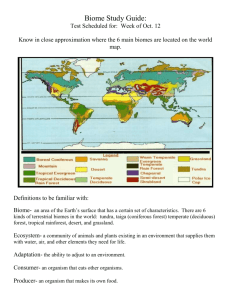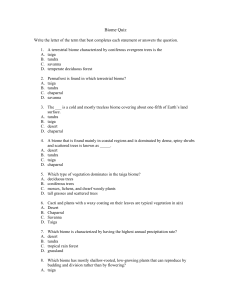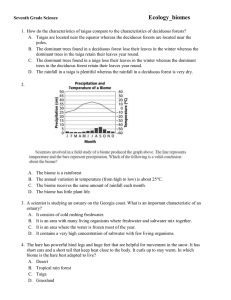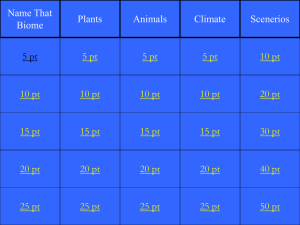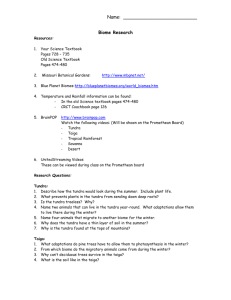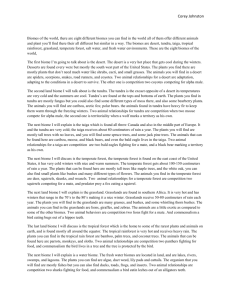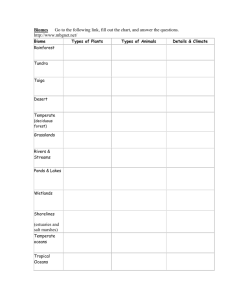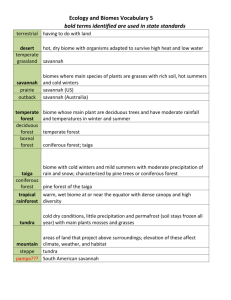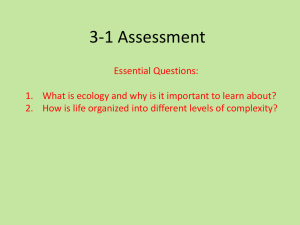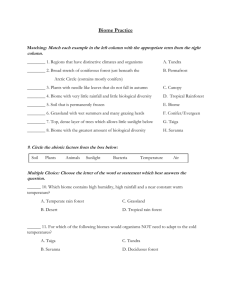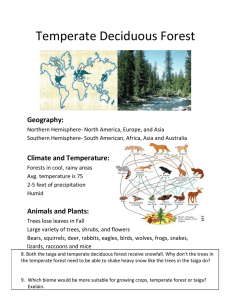Power Point
advertisement
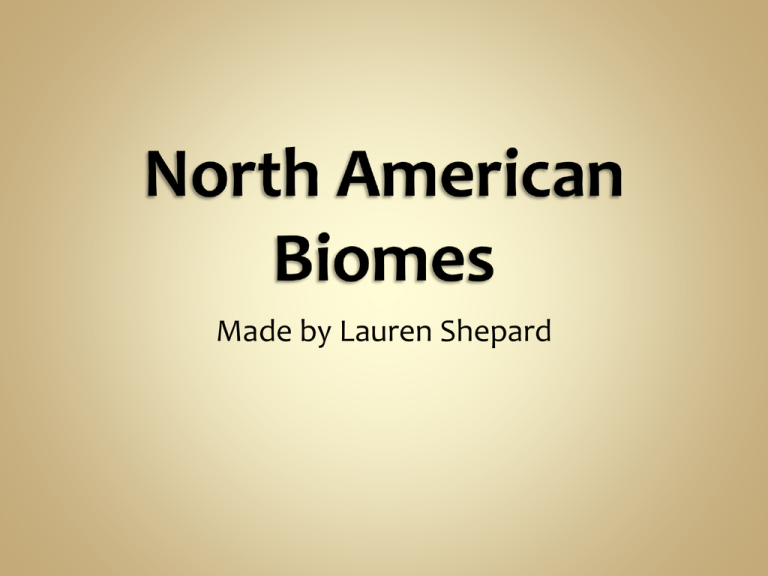
Made by Lauren Shepard Biomes are the world’s major communities where insects, animals, plants, and people live in a certain type of climate. The biomes we will be covering in this lesson are: Desert Deciduous Forest Arctic tundra Tropical Rainforest Grasslands Taiga Characteristics: Hot and dry Desert covers about 1/5 of the Earth’s land surface For the plants to survive they adapt: Store water for long periods of time Stand the hot weather Hottest biome on earth Can be over 100 degrees during the day and below 32 degrees at night There is very little rain in the desert but when it does rain, it pours After a storm, it may not rain again for weeks or months Plants in the desert may have to go without water for over a year! Here some examples of desert plant life: Chainfruit Cholla Creosote Bush Jumping Cholla Saguaro cactus Some animals that live in the Desert include: Bobcat Cactus Wren Coyote Javelina Thorny Devil Characteristics: 5 different zones Tree Stratum: trees between 60 and 100 feet high Small tree and sapling: young and short trees Shrub zone Herb zone Ground zone Has four distinct seasons: Spring, Summer, Autumn, and Winter Almost all deciduous forests are located by an ocean The ocean and the wind are two main reasons that the temperate and climate change so much during the year Some examples of deciduous forest plants are: American beech Guelder Rose Pecan White Birch There are a lot of animals that live in the deciduous forest biome but some examples are: American Bald Eagle Duckbill Platypus Eastern Chipmunk Least Weasel White-tailed Deer Characteristics of the Arctic Tundra: Treeless Very cold The ground is permanently frozen There is barely any plant life, but there are animals Unusually cold and dry climate The Tundra is cold through all months of the year The short summer lasts only 6 to 10 weeks and does not get any warmer than 45-50 degrees There are few plants that can grow in the arctic tundra, but some that can include: Arctic Moss Bearberry Pasque Flower Tufted Saxifrage Animals that live in this biome include: Arctic Fox Caribou Musk Ox Polar Bear Characteristics: Forest of tall trees The rainforest now covers less than 6% of Earth’s land Layers Emergent: trees are 100- 240 feet tall! These trees grow above everything else Upper canopy The trees are 60-130 feet tall Most of the animals live in this layer Understory or Lower canopy Trees are about 60 feet tall The Forest Floor Completely shaded and very few plants In the rainforest the climate is: Very humid because of the heavy rainfall Very hot and wet Tropical rainforests produce 40% of Earth’s oxygen, some of the plants that live in this biome include: Bengal Bamboo Coconut tree Kapok Tree Mangrove Forests Half of the world’s plants and animals species live in the rainforest! Here are some of the many animals: Bengal Tiger Chimpanzee Toco Toucan Sumatran Rhinoceros Characteristics Large rolling fields of grasses, flowers, and herbs Drought and fire percent large forests from growing Grass survives the fire because they grow from the bottom instead of the top There are many different types of grasslands around the world. But the climate in the United States is: The temperature is moist and humid The summers are warm and humid but the winters are not too cold There is constant Wind Some plants that thrive in this biome are: Ironweed Common teasel Dogbane Queen Ann’s Lace Animals that are commonly found in the grassland are: Red milkweed beetle Bison Przewalski’s horse Characteristics: Coldness and food shortages make things very difficult The largest biome in the world Known as the boreal forest The climate in the Taiga is: The winter is freezing cold The temperature range goes from -65 degrees Fahrenheit all the way to 70 degrees Average rainfall is between 12-33 inches Plants that are able to survive in the taiga include: Balsam Fir Jack pine White fir White Spruce Most animals in the taiga hibernate in winter or fly south but some stay which is very difficult! Here are some examples of animals that live in the taiga: Bobcat Long-Eared Owl River Otter Wolverine http://www.blueplanetbiomes.org/ http://www.kidskonnect.com/subject-index/15science/62-biomes.html
